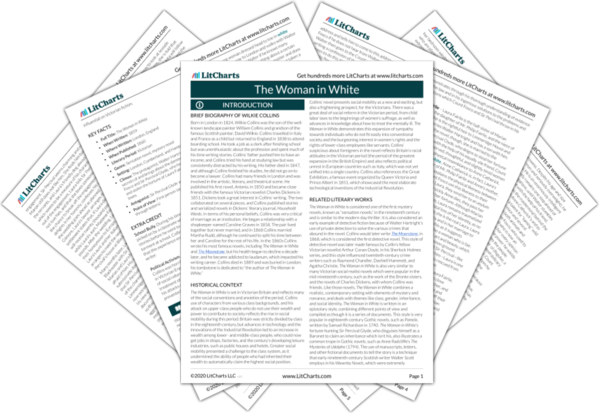Mr. Gilmore Quotes in The Woman in White
It is the great beauty of the Law that it can dispute any human statement, made under any circumstances, and reduced to any form. If I had felt professionally called upon to set up a case against Sir Percival Glyde, on the strength of his own explanation, I could have done so beyond all doubt. But my duty did not lie in this direction: my function was of the purely judicial kind. I was to weigh the explanation we had just heard; to allow all due force to the high reputation of the gentleman who offered it; and to decide honestly whether the probabilities, on Sir Percival’s own showing, were plainly with him, or plainly against him. My own conviction was that they were plainly with him; and I accordingly declared that his explanation was, to my mind, unquestionably a satisfactory one.
As matters stood, my client – Miss Fairlie not having yet completed her twenty-first year – was her guardian, Mr. Frederick Fairlie. I wrote by that day’s post and put the case before him exactly as it stood; not only urging every argument I could think of to induce him to maintain the clause as I had drawn it, but stating to him plainly the mercenary motive which was at the bottom of the opposition to my settlement of the twenty thousand pounds. The knowledge of Sir Percival’s affairs which I had necessarily gained when the provisions of the deed on his side were submitted in due course to my examination, had but too plainly informed me that the debts on his estate were enormous, and that his income, though nominally a large one, was, virtually, for a man in his position, next to nothing.

Mr. Gilmore Quotes in The Woman in White
It is the great beauty of the Law that it can dispute any human statement, made under any circumstances, and reduced to any form. If I had felt professionally called upon to set up a case against Sir Percival Glyde, on the strength of his own explanation, I could have done so beyond all doubt. But my duty did not lie in this direction: my function was of the purely judicial kind. I was to weigh the explanation we had just heard; to allow all due force to the high reputation of the gentleman who offered it; and to decide honestly whether the probabilities, on Sir Percival’s own showing, were plainly with him, or plainly against him. My own conviction was that they were plainly with him; and I accordingly declared that his explanation was, to my mind, unquestionably a satisfactory one.
As matters stood, my client – Miss Fairlie not having yet completed her twenty-first year – was her guardian, Mr. Frederick Fairlie. I wrote by that day’s post and put the case before him exactly as it stood; not only urging every argument I could think of to induce him to maintain the clause as I had drawn it, but stating to him plainly the mercenary motive which was at the bottom of the opposition to my settlement of the twenty thousand pounds. The knowledge of Sir Percival’s affairs which I had necessarily gained when the provisions of the deed on his side were submitted in due course to my examination, had but too plainly informed me that the debts on his estate were enormous, and that his income, though nominally a large one, was, virtually, for a man in his position, next to nothing.











